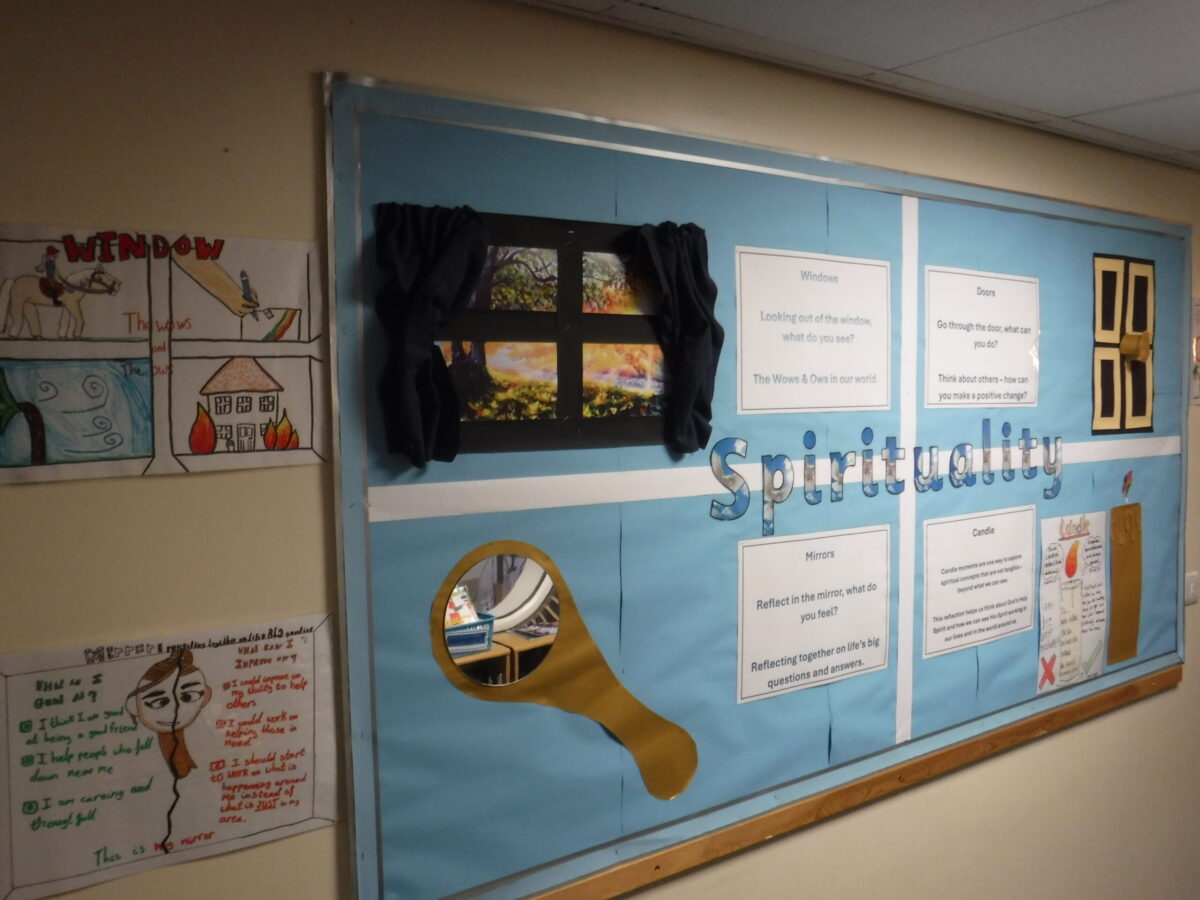Jesus said,
“I have come in order that you might have life—life in all its fullness.”
John 10:10
This is the precept and vision upon which Elvington Church of England Primary School is founded. We are committed to enabling each member of our community to flourish. With the role model of Christ as our cornerstone, we are developing an environment where everyone can flourish and achieve their full potential.
At Elvington, we believe that spiritual development is a fundamental aspect of children’s personal progress that exists beyond faith or religious affiliation. We work to enable children to develop holistically so that they become happy, fulfilled, spiritually aware and socially and emotionally engaged.
Spirituality is explored through Mirror, Door, Window and Candle Moments during Collective Worship and throughout the school day. Please see the ‘Spiritual Moments’ display (pictured) to learn more. These moments provide opportunities for children to pause, reflect and think deeply about the world around them and their role within it.
Windows: This element provides children with opportunities to explore new perspectives and possibilities. Through the use of drama, visual imagery, poetry, video clips and stories from the Bible or other texts, children are encouraged to engage with ideas and experiences beyond their immediate context. In doing so, they are developing an understanding of life in all its richness and complexity. We give children opportunities to experience the world in new ways—to wonder at life’s ‘Wows’ (moments that amaze us and evoke awe) and ‘Ows’ (moments that could upset us and challenge our understanding). Through this, our children are learning about life in all its fullness.
Mirrors: This aspect encourages reflection. Children are invited to consider how a Bible story or other stimulus resonates with or challenges them personally. Guided meditations or thought-provoking questions enable children to examine their own insights and perspectives, as well as those of others. This promotes learning from life through introspection and dialogue.
Doors: This component focuses on response and action. Children are given opportunities to express and apply their developing thoughts and beliefs creatively. By engaging in meaningful activities, they learn to live out the values and convictions they are developing; translating reflection into purposeful action.
Candles: This element provides time for contemplation and spiritual connection. Children are encouraged to connect with God, reflect on their experiences, or explore and make sense of the world through discussion and shared reflection. This fosters a sense of calm, spiritual awareness and thoughtful engagement with themselves and others.
Collective Worship and Religious Education
Collective Worship and Religious Education (RE) are key aspects of school life and provide ideal vehicles for spiritual development.
Collective Worship provides opportunities for:
- Reflection and response
- Thinking deeply and drawing links between ideas
- Stillness and prayer
- Respecting personal and collective beliefs
- Sharing and celebrating common beliefs, successes, and talents
- Experiencing a range of emotions, including happiness, sorrow, excitement, and fear
- Participating in shared activities such as singing, listening, laughing, and reflecting on themes
- Remembering and celebrating the lives of people of spiritual significance
- Engaging sincerely with a sense of higher purpose
- Pupil-led worship, enabling children to support the spiritual development of others, fostering fulfilment and spiritual growth
- Creative responses to experience through music, drama, poetry and story
- Using visual stimuli such as religious symbols, candles, art, photos and video.
Religious Education (RE) allows children to explore the spiritual experiences of others and how these shape lives. RE encourages reflection on personal experiences and engagement with ultimate questions of meaning and purpose, including ideas of mystery and questions without easily accessible answers.
Spiritual Development Across the Curriculum
The wider curriculum also provides rich opportunities for spiritual development. All members of staff highlight where learning experiences allow for spiritual reflection:
- Physical Education: teamwork, pushing personal limits, skill and endurance, sportsmanship, emotional responses to success and accepting defeat, appreciation of perfection
- Design and Technology: discovering how things work, ingenuity, beauty in design, perseverance, learning from others, personal achievement
- Literacy: empathy with authors and characters, beauty of language, emotions in writing and speech, heroes and heroines, poetry, imagination, wonder, pleasure in creative process
- Numeracy: concepts of infinity and zero, pattern and order, universality of mathematics, truth, certainty, and the wonder of numbers and formulas
- Science: wonder and curiosity, questions of creation, experimentation limits, life and death, the universe, regularity and order, scientific beliefs and achievements
- ICT: wonder of global communication, rapid growth of knowledge, accessibility of information and worldwide collaboration
- Creative Arts (Art, Music, Drama & Dance): creativity, beauty, truth, expression of deep feelings and beliefs, skill development, emotional engagement, personal reflection, fulfilment, and transcendence
- Geography: wonder at environmental diversity, care for the planet, understanding beliefs behind causes, world development, empathy with global communities
- History: connection with past people, events, and ideas, handling artefacts, understanding significant historical figures, interpretation, empathy with people from other times, understanding invention and exploration.


